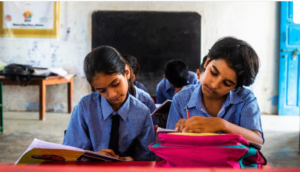In a bid to enhance the quality of education and adapt to the evolving needs of students, the Central Board of Secondary Education (CBSE) has announced new curriculum guidelines for classes 3 to 6. These guidelines, aimed at fostering holistic development and 21st-century skills among students, mark a significant step in the transformation of the Indian education system. In this comprehensive article, we delve into the details of the new curriculum, its objectives, structure, and potential impact on students, teachers, and the education landscape as a whole.
 for more information click on this link
for more information click on this link
The CBSE curriculum serves:
The primary objectives of the new curriculum guidelines for classes 3 to 6 are as follows:
The CBSE curriculum serves as the backbone of education for millions of students across India. Over the years, the board has continuously evolved its curriculum to keep pace with changing educational paradigms, technological advancements, and societal demands. The introduction of the new curriculum guidelines for classes 3 to 6 is a testament to CBSE’s commitment to providing a modern and relevant education to students.
- Holistic Development: The curriculum aims to foster the holistic development of students by focusing on the cognitive, emotional, social, and physical aspects of learning. It seeks to cultivate well-rounded individuals capable of navigating the complexities of the modern world.
- 21st-Century Skills: In line with global educational trends, the curriculum emphasizes the development of 21st-century skills such as critical thinking, creativity, communication, collaboration, and digital literacy. These skills are essential for success in the contemporary workplace and society.
- Experiential Learning: The curriculum prioritizes experiential learning approaches that encourage active participation, inquiry-based learning, and hands-on exploration. By engaging students in real-world experiences, the curriculum aims to deepen their understanding and retention of concepts.
- Inclusivity and Diversity: Recognizing the diverse backgrounds and learning needs of students, the curriculum promotes inclusivity, equity, and diversity. It endeavors to create an inclusive learning environment where every student feels valued, respected, and supported.
- Environmental and Social Awareness: With a focus on sustainability and social responsibility, the curriculum integrates environmental education, civic awareness, and ethical values into the learning process. It aims to nurture environmentally conscious and socially responsible citizens who contribute positively to society.
The new curriculum guidelines for classes 3 to 6 encompass a range of key features designed to enhance the learning experience for students:
- Interdisciplinary Approach: The curriculum adopts an interdisciplinary approach that integrates concepts and skills from multiple disciplines. By breaking down traditional subject silos, it encourages a holistic understanding of complex issues and promotes connections across different areas of knowledge.
- Activity-Based Learning: A central tenet of the curriculum is activity-based learning, which emphasizes hands-on activities, projects, experiments, and group work. Through active engagement and experiential learning, students develop critical thinking, problem-solving, and communication skills.
- Project-Based Assessments: In place of traditional examinations, the curriculum emphasizes project-based assessments that require students to demonstrate their understanding through practical applications. This shift towards formative assessment encourages deeper learning and reduces reliance on rote memorization.
- Digital Integration: Recognizing the transformative role of technology in education, the curriculum promotes the integration of digital tools and resources into teaching and learning. From interactive multimedia presentations to online research projects, technology is leveraged to enhance the learning experience and facilitate personalized instruction.
- Life Skills Education: In addition to academic content, the curriculum incorporates life skills education to equip students with essential competencies for personal and professional success. Topics such as time management, stress management, decision-making, and interpersonal skills are integrated into the curriculum to empower students for life beyond the classroom.
To facilitate the smooth implementation of the new curriculum guidelines, CBSE has put in place various support mechanisms:
- Teacher Training Programs: CBSE conducts teacher training programs and workshops to familiarize educators with the new curriculum framework and pedagogical approaches. These programs equip teachers with the knowledge, skills, and resources necessary to effectively implement the curriculum in their classrooms.
- Resource Materials: CBSE provides comprehensive resource materials, including textbooks, teacher guides, lesson plans, and multimedia content, to support teachers in delivering the curriculum. These resources are designed to align with the curriculum objectives and facilitate engaging and interactive learning experiences for students.
- Continuous Monitoring and Evaluation: CBSE undertakes continuous monitoring and evaluation of the implementation of the new curriculum guidelines to identify areas for improvement and ensure adherence to quality standards. Feedback mechanisms are established to gather input from stakeholders and make necessary adjustments based on their insights.
- Parent and Community Engagement: CBSE encourages active involvement of parents and the community in supporting the implementation of the new curriculum. Through workshops, seminars, and outreach programs, parents are educated about the curriculum objectives, their role in supporting their child’s learning,





